Comparing Built-In Outdoor Gas Grills to Portable Propane Grills
7-minute read | Grills
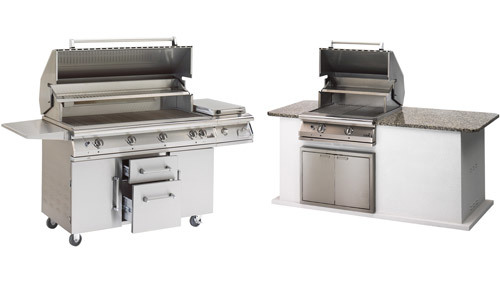
When you're shopping for the ideal grill for your home or even adding features to a multi-family property, you’ve got two main choices. You can opt for:
- Built-in grills – These could either be pedestal-mounted or island-mounted
- Portable grills – Think of them as cart-mounted grills
Each option has its own set of advantages. Our grills are crafted with either a stainless steel lid and basin or a cast aluminum lid and basin. Both materials are durable enough to withstand the elements, the heat of cooking, and ensure you have a quality grill that will last for years.
No matter which path you take, both options make a fantastic addition to any outdoor living space. There are even choices available for smaller patios or larger grills suited for more expansive locations.
What’s the Same Between Built-In Outdoor Gas Grills and Portable Propane Grills
Pride in Design – One of the first things that are similar between our built-in outdoor grills and our portable propane grills is the pride we take in their design. We create grills that we’d be proud to have in our homes, and we hope you’ll feel the same about having them in your outdoor living area or patio.
Fuel Options – Another similarity is that both types of grills—whether mounted or mobile—come in both natural gas and propane models. This allows you to choose the type of fuel that suits your needs. If you already have natural gas hookups on-site, an NG grill might be the best choice; but if you need portability, an LP grill may be the better option. The only real difference between these two models is the fitting type—one has NG fittings, and the other has LP fittings.
Durable Materials – Quality materials keep our grills looking great for years. You can choose between a stainless steel or cast aluminum lid and basin. Both materials resist heat and weather and can handle frequent use. Ultimately, it comes down to personal preference regarding aesthetics, as cast aluminum grills might be slightly less expensive overall.
Stainless Steel Internals – With over 40 years of experience in grill design and manufacturing, we know that stainless steel is the way to go when building the internal components of gas grills. Whether you choose a portable propane grill, a natural gas patio grill, or one of our built-in grills, you’re getting quality stainless steel internal components. Many of these components come with lifetime warranties. Explore the options for burners, grates, and accessories. Great grilled meals start with high-quality grills.
Mount It or Move It – Almost all of our grills are designed to be easily mounted in place or attached to a cart. This gives customers more flexibility for installation. For smaller spaces, a portable cart mount allows you to maximize the space you have while storing the grill away when not in use. If you have a dedicated spot for a grill, mounting it is a great option as well. Its sturdy construction ensures it can endure the elements.
Designed to Last – With quality materials supported by 40 years of grill design and manufacturing expertise, every grill and accessory we offer will let you enjoy delicious meals for years to come. Be sure to check out our warranty and owner’s manuals for peace of mind.
Built-In Grills
A built-in grill is one that is permanently mounted in place, whether on a pedestal, an island, or bolted onto a grill cart. These grills are essentially non-movable fixtures. They’re often found in multi-family dwellings or designated grilling areas on patios. Once installed, they remain in place until removed.
Perfect for Natural Gas
Built-in patio grills are ideal for natural gas. Since the grill is fixed in place, you can connect it directly to a natural gas line—eliminating the need to transport propane tanks.
Mounting Options
Many built-in grills are pedestal-mounted. You can also choose to install the grill on an island, providing it with a permanent location. Alternatively, some grills are mounted on carts without wheels, which are then bolted to the ground. While the cart itself is stationary, the grill remains immovable.
Propane or Natural Gas
Just because a grill is mounted doesn’t mean it can’t run on propane. If you prefer portability, you can still use a propane grill.
Built-in grills are highly popular in commercial settings and multi-family properties. They’re straightforward to install, and they make managing a grilling area much simpler. Additionally, they’re a big hit on the amenities list for these properties.
Portable Propane Grills
All of our portable grills are designed to run on LP—Liquid Propane. Each unit is built to hold a propane tank beneath the grill, meaning a propane patio grill operates exclusively on LP.
Since the grill isn’t mounted, it’s mobile. This mobility offers several advantages:
- You can position the grill wherever you want in your outdoor living space, adjusting it based on other activities or bringing in a second grill for larger gatherings.
- The ability to move the grill allows you to store it when it’s not in use, freeing up space on the patio for other activities. In smaller backyards, this flexibility maximizes usable space.
- In commercial settings, portable propane grills make it easier to manage grilling areas and equipment. You can safely store the grills out of the way when not in use, and residents can wheel them out when needed.
Which type of grill is better for your needs? If grilling is a regular activity at your home or apartment complex, a mounted grill might make life easier. On the other hand, if grilling is something you only do occasionally, you can store a portable propane grill when not in use, giving you more room to enjoy your outdoor living spaces. No matter what you choose, we have the perfect grill for your grilling needs. For more information about grills, warranties, or grill parts, feel free to contact us by phone or online. We’re here to enhance your outdoor grilling experience.
Need more details? Got a question? Reach out to us today, and we’ll be glad to assist!
HONY®Polyethylene (PE) plastic is a semi-crystalline thermoplastic with high toughness and excellent chemical resistance. Compared with other plastics, polyethylene plastics have lower mechanical strength and high temperature resistance.High Density Polyethylene (HDPE) sheet is extremely strong against impact, abrasion resistant, and exhibits a low coefficient of friction. The material is also moisture, stain, and odor resistant, and is FDA approved for use in the food processing industry (mainly for cutting boards). The material's durability makes it a perfect match for a variety of applications such as water tanks, chute linings, bottle/bottle cap production and numerous other industrial uses. Borated HDPE offers radiation protection in nuclear facility applications.
High-density Poly Ethylene also is known as HDPE is made from a cord of ethylene molecules (the poly part of polyethylene), and is famous for its light weight and high durability.
The preference of HDPE sheets is increasing from leaps and bounds in the market today, as it's able to cut down on the material which is then used for producing and packaging products for its strength and weight.
It is also available at tap plastics in sheet form with either a smooth or textured surface. The textured surface is also called cutting board. Both smooth and textured surfaces are FDA approved for food contact.
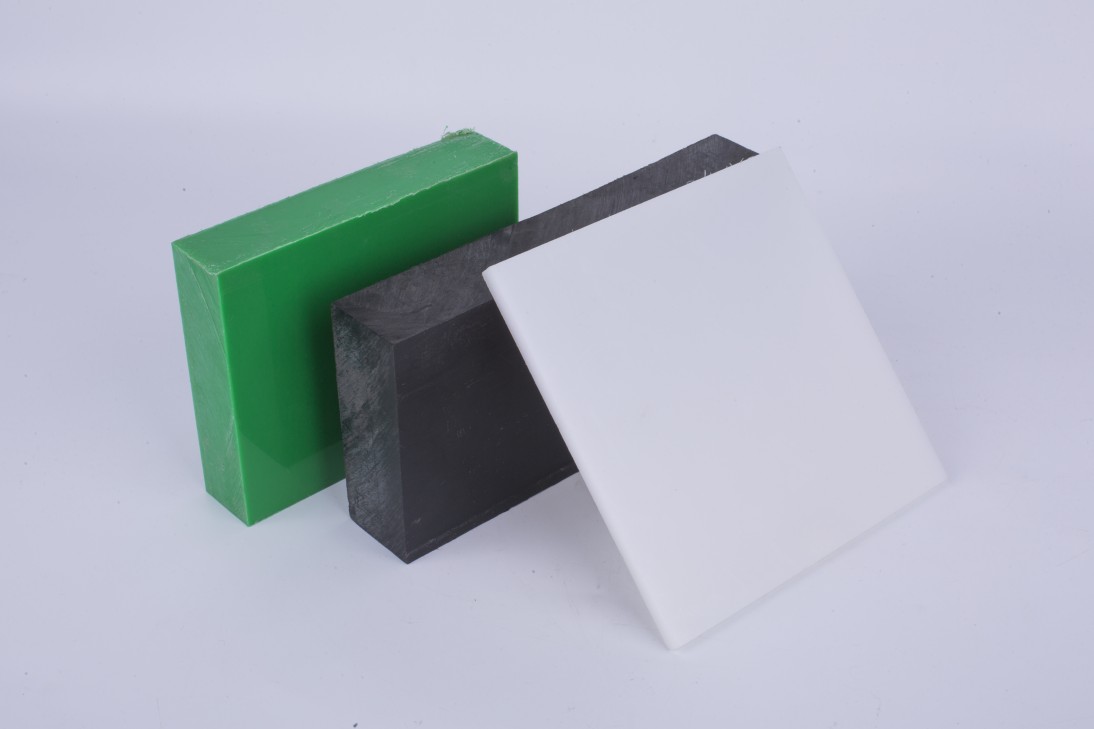
HONY®PE series products include the following materials:
Polyethylene (PE) Polyethylenes are semi-crystalline materials with excellent chemical resistance, good fatigue and wear resistance and a wide range of properties. Polyethylenes are easy to distinguish from other plastics because they float in water. Polyethylenes provide good resistance to organic solvents, degreasing agents and electrolytic attack. Polyethylene is used more than any other thermoplastic polymer. There are a wide variety of grades and formulations available that have an equally wide range of properties.
Benefits
Durability Easily fabricated
Chemical resistance Abrasion resistance
Good electrical properties
Impact resistance
Low coefficient of friction
Moisture resistance
Applications
Packaging
Skid
Plates
Conveyer
Systems
Tanks
Containers
Truck liners
POLYETHYLENE GRADES Low Density Polyethylene (LDPE) This extruded material offers good corrosion resistance and low moisture permeability. It can be used in applications where corrosion resistance is important, but stiffness, high temperature, and structural strength are not. A highly flexible product, LDPE is used widely in orthopaedic products, or where mobility without stress fatigue is desired. LDPE is also frequently used in consumer packaging, bags, bottles, and liners.
Benefits
Lightweight
Formable Impact
Resistant
Good electrical properties
Easily cleaned
Easily Fabricated
Applications
Chemical resistant tank and containers
Food storage containers
Laboratory equipment
Corrosion resistant work surfaces
Vacuum formed end caps and tops
Moisture barrier
POLYETHYLENE GRADES High Density Polyethylene (HDPE) Representing the largest portion of the polyethylene applications, HDPE offers excellent impact resistance, light weight, low moisture absorption, and high tensile strength. HDPE is also non-toxic and non-staining and meets FDA and USDA certification for food processing.
Benefits
Abrasion Resistant
High impact resistance
Low coefficient of friction
Abrasion resistant
Scratch and marking resistant
Chemical resistant
Water and moisture resistant
Applications
Food cutting boards
Corrosion resistant covers
Pipe flanges
Radiation shielding
Self-supporting containers
Prosthetic devices
Ultra High Molecular Weight Polyethylene (UHMW PE) UHMWPE is light weight (1/8 the weight of steel), high tensile strength, and is easily machined. It is the ideal material for many wear parts in machinery and equipment as well as a superb lining in material handling systems and storage containers. UHMW PE is self-lubricating, shatter resistant, long-wearing, abrasion and corrosion resistant. It meets FDA and USDA acceptance for food and pharmaceutical equipment and is a good performer in applications up to 180 °F (82 °C) or when periodically cleaned with live steam or boiling water to sterilize.
uhmwpe Benefits
Durability
Easily fabricated
Chemical resistance
Abrasion resistance
Electrical properties
Impact resistance
Low coefficient of friction
Moisture resistance
hdpe Applications
Tanks and containers
Food storage containers
Laboratory equipment
Disposable formed products
Surface structures
Vacuum formed end caps and tops
Moisture barrier
Sheet Hdpe Feature
Low density
Excellent wear resistance
Very resistant to damage
High toughness (the same at low temperature)
High elongation at break
Excellent electrical and dielectric properties
Very low water absorption
Low vapor permeability
Strong chemical resistance
Good resistance to stress cracking
Food safety
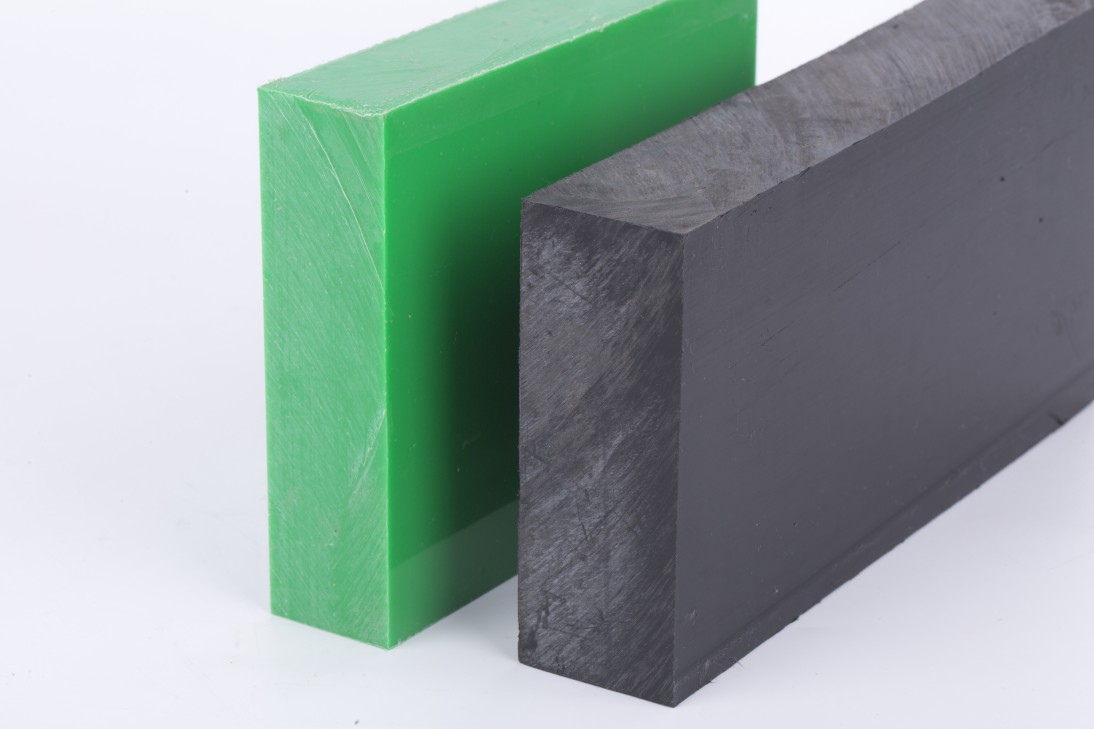
Polyethylene Sheet Application
Guide pulley
Guide chain
Pads for storage blocks, silos and conveyor channels
Suction cups and filter plates
Pumps and valves
Gasket
Slide model
Food industry parts
Item
RESULT
UNIT
PARAMETER
NORM USED
Mechanical properties
Modulus of elasticity
1000
MPa
In tension
DIN EN ISO 527-2
Modulus of elasticity
1000 - 1400
MPa
In flexure
DIN EN ISO 527-2
Tensile strength at yield
25
MPa
50 mm/min
DIN EN ISO 527-2
Impact strength (Charpy)
140
Kj/m 2
Max. 7,5j
Notched Impact stren. (Charpy)
No break
Kj/m 2
Max. 7,5j
Ball indentation hardness
50
MPa
ISO 2039-1
Creep rupture strength
12,50
MPa
After 1000 hours static load 1% elong. after 1000 hours Against steel p=0,05 N/mm 2
Time yield limit
3
MPa
Coefficient of friction
0,29
------
Thermal properties
Glass transition temperature
-95
°C
DIN 53765
Crystalline melting point
130
°C
DIN 53765
Service temperature
90
°C
Short term
Service temperature
80
°C
Long term
Thermal expansion
13 - 15
10-5K-1
DIN 53483
Specific heat
1,70 - 2,00
J/(g+K)
ISO 22007-4:2008
Thermal conductivity
0,35 - 0,43
W/(K+m)
ISO 22007-4:2008
Heat distorsion temperature
42 - 49
°C
Method A
R75
Heat distorsion temperature
70 - 85
°C
Method B
R75
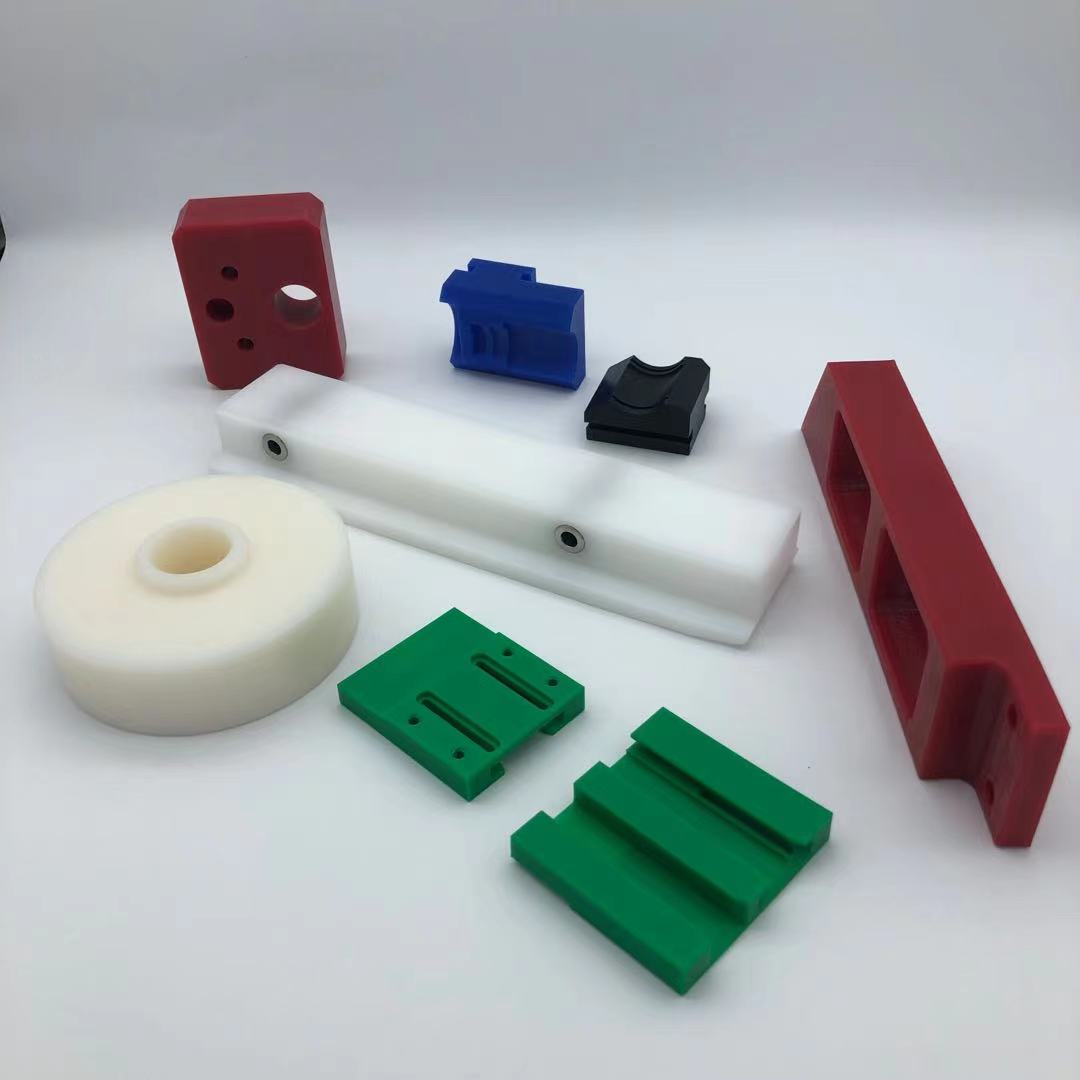
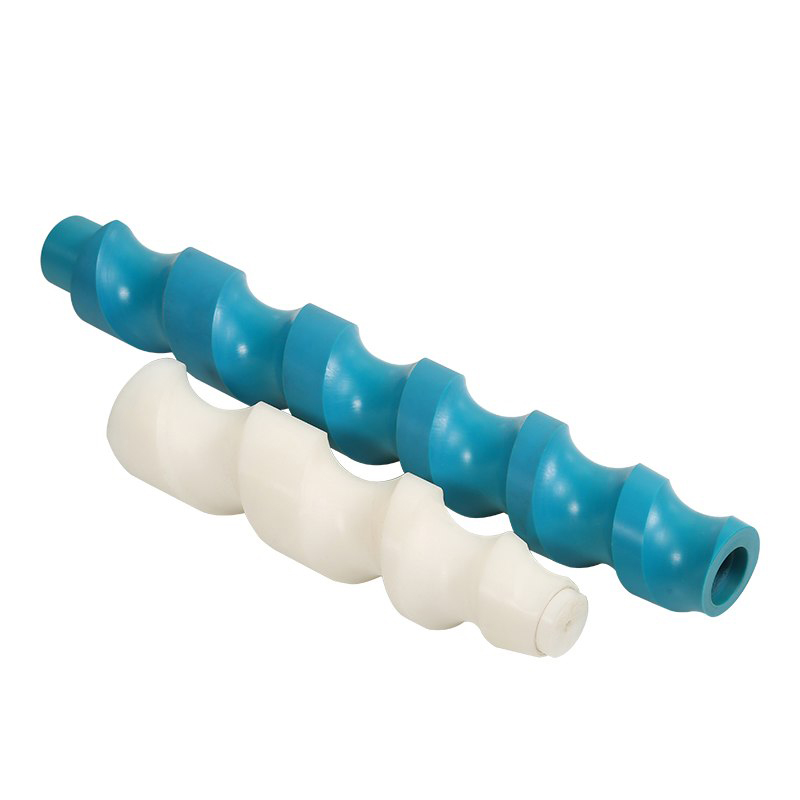
Polyethylene Sheet,Polyethylene (High Density) HDPE,uhmwpe plate shaft,hdpe,Ultra high molecular weight polyethylene
Hony Engineering Plastics Limited , https://www.honyplastic.com